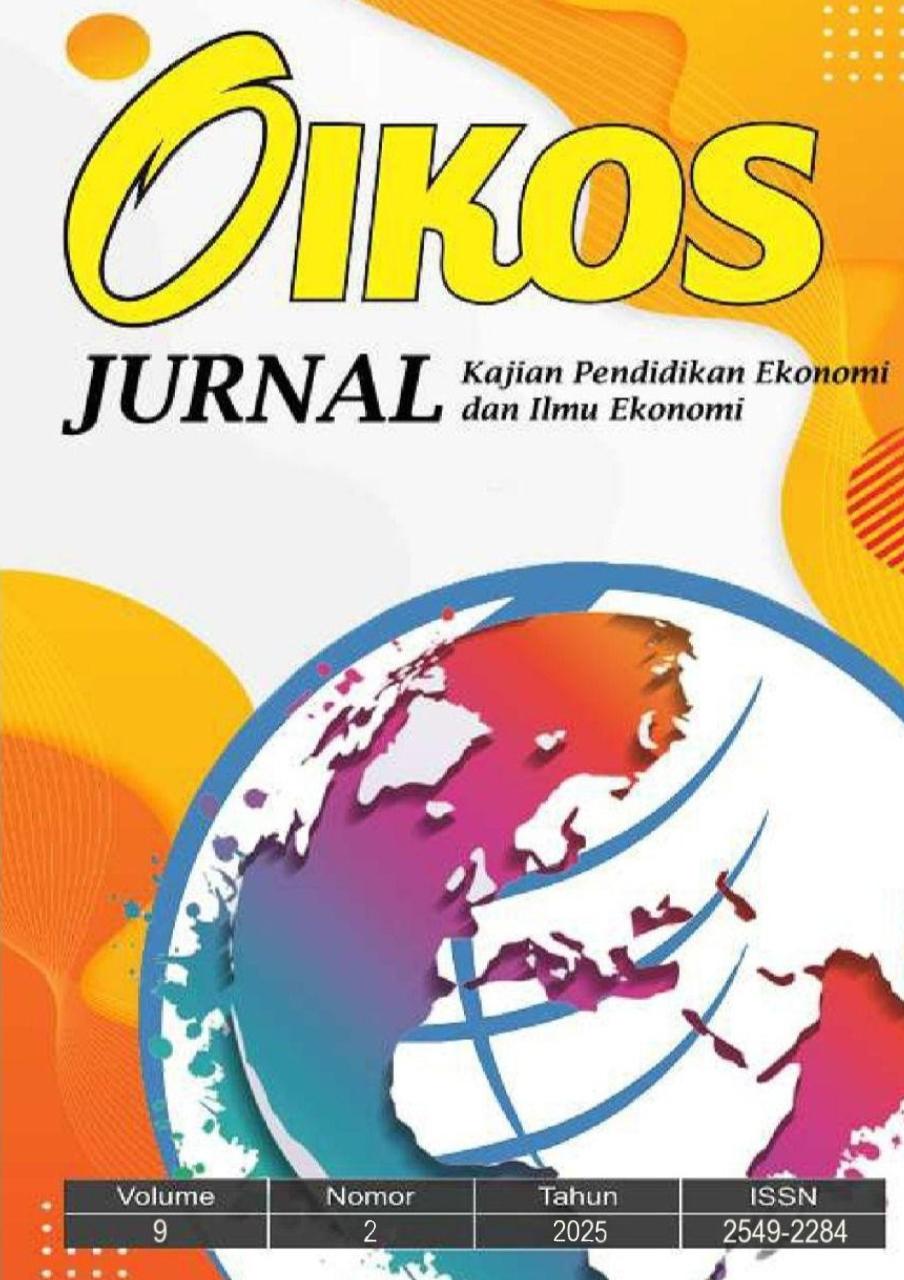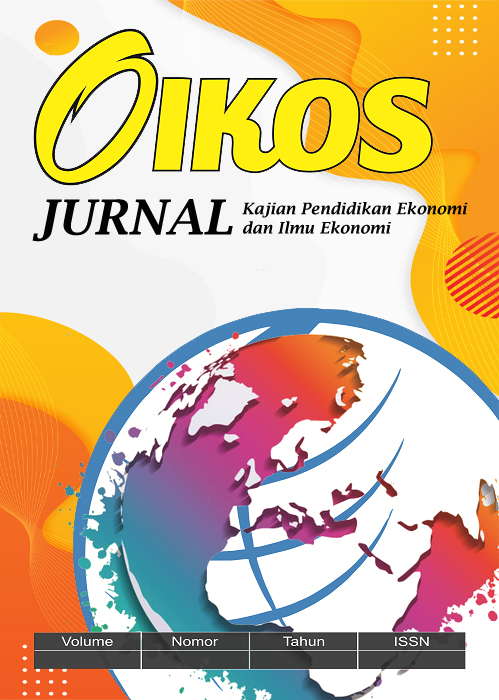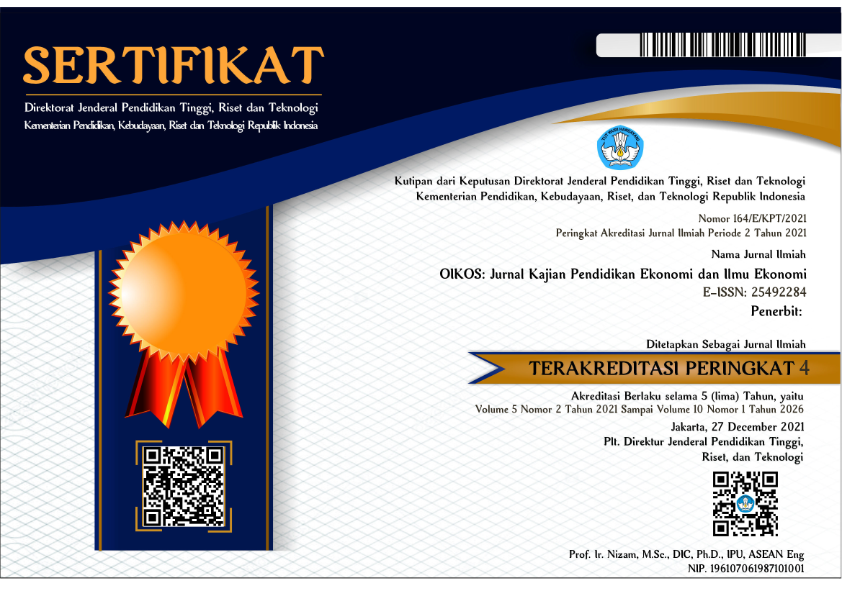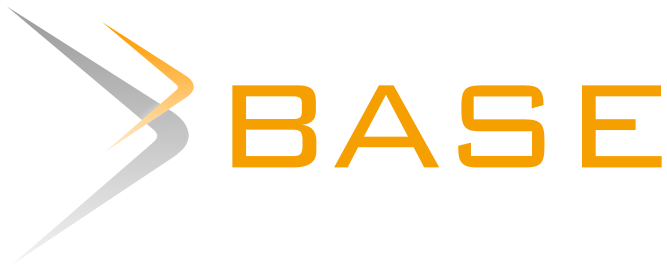ANALISIS IMPLEMENTASI MODEL PROBLEM BASED LEARNING (PBL) DALAM MENGEMBANGJAN KEMAMPUAN BERPIKIR KRITIS PESERTA DIDIK
Keywords:
Model PBL, Critical Thinking, Students, economyAbstract
Education plays a fundamental role in shaping individuals who are intelligent, religious, and of good character, thereby enabling them to contribute to the progress of the nation. In the context of strengthening 21st-century learning that emphasizes critical thinking skills, this study aims to examine the effectiveness of the Problem Based Learning (PBL) model in developing students' critical thinking abilities in economics subjects, specifically on the topic of payment systems and instruments. This study uses a qualitative approach with a case study design at MA Nurul Iman Sumberjambe Jember. The research subjects include economics teachers, X IPS class students, the principal, and the curriculum deputy. Data collection techniques include observation, interviews, and documentation, while data analysis is conducted through data condensation, presentation, and conclusion drawing, with validity tested through triangulation. The research results show that the application of the PBL syntax—comprising problem analysis, diagnosis, and alternative solutions—systematically fosters the critical thinking skills of students. That ability is evident in the processes of information search, logical reasoning, cause-and-effect analysis, and solution formulation for contextual economic problems. This research provides a new contribution in affirming the effectiveness of PBL in economic learning, which has not been extensively studied in depth, particularly on the topic of payment systems and instruments. Therefore, PBL has proven to be a relevant and applicable model in creating active, reflective, and meaningful economic learning.
Downloads
References
Alicia, Febi. Analisis Implementasi Sistem Pengendalian Internal Untuk Mencegah Kredit Macet Pembiayaan Musyarakah Modal Kerja (Studi Kasus Bank Syariah Indonesia Kcp Kisaran), JPEK (Jurnal Pendidikan Ekonomi dan Kewirausahaan), Vol. 9, No. 1 April 2025.
Al-Tabany, Trianto Ibnu Badar. Mendesain Model Pembelajaran Inovatif, Progresif dan Kontekstual: Konsep, Landasan dan Implementasinya pada Kurikulum 2013. Jakarta: PT Kharisma Putra Utama. 2017.
Barret, Terry. A New Model of Problem-Based Learning: Inspiring Concepts, Practice Strategies and Case Studies from Higher Education. The British Journal of Psychiatry. 2017
Dewi, Luh Putu Mina Kusuma. PENGEMBANGAN MEDIA VIDEO PEMBELAJARAN BERBASIS KEARIFAN LOKAL SUBAK PADA MATA PELAJARAN IPS DI SMP NEGERI 1 SINGARAJA, Jurnal Pendidikan Teknologi dan Kejuruan, Vol. 20, No. 2, Juli 2023
Gunarsa, Komang Gede Raditya. Persepsi Mahasiswa Terhadap Kebijakan MBKM dan Relevansi Kurikulum, Ekuitas: Jurnal Pendidikan Ekonomi, Volume 12, Number 1, Tahun 2024.
Khakim, Nor. Penerapan Model Pembelajaran Problem Based Learning Dalam Meningkatkan Motivasi Belajar PPKn Di SMP YAKPI 1 DKI Jaya. Jurnal Citizenship Virtues. 2022
Laga, Yulius. Persepsi Mahasiswa terhadap Kebijakan Merdeka Belajar Kampus Merdeka (MBKM), Edukatif : Jurnal Ilmu Pendidikan Volume 4 Nomor 1 Tahun 2022.
Lestari, Yeni Kusuma.Tackling the Future: Optimizing TVET Students of Employability Skills Through Self-Regulated Learning and Self-Efficacy, Ekuitas: Jurnal Pendidikan Ekonomi Volume 12, Number 1, Tahun 2024.
Nendi, Ikhsan. Implementasi Project Based Learning dalam Meningkatkan Pemahaman Siswa pada Konsep Ekonomi Berkelanjutan, JPEK (Jurnal Pendidikan Ekonomi dan Kewirausahaan) Vol. 9, No. 1 April 2025.
Noni, Enok Masrinah. Problem Based Learning (PBL) Untuk Meningkatkan Keterampilan Berpikir Kritis. Seminar Nasional Pendidikan. 2019.
Oestreicher, David Benjamin. The Effect of a Problem-Based Learning (PBL) Program on the Development of Problem-Solving (a 21St Century Skill) in High School Students. 2019.
Permendikbudristek. Peraturan Menteri Pendidikan Kebudayaan Riset Dan Teknologi Tentang Standar Proses Pada Pendidikan Usia Dini, Jenjang Pendidikan Dasar Dan Jenjang Pendidikan Menengah. Peraturan Menteri Pendidikan Dan Kebudayaan Republik Indonesia Nomor 16 Tahun 2022 Tentang Standar Proses Pendidikan Dasar Dan Menengah.2022.
Putri, Novita Samnia. Pengaruh penggunaan e-money, BI-rate dan jumlah uang beredar terhadap pertumbuhan ekonomi di Indonesia, E-Journal Perdagangan Industri dan Moneter Vol. 12. No. 1, Januari −April 2024
Raco. Metode Penelitian Kualitatif: Jenis, Karakteristik, dan Keunggulannya. Jakarta: Gramedia Widiasarana. 2010
Rahmadani. Metode Penerapan Model Pembelajaran Problem Based Learning (PBL). Lantanida Journal. 2019
(Ramadhani, 2019)
Rianto, Milan. Pendekatan, Strategi, dan Metode Pembelajaran. Malang: PPPG IPS dan PMP Malang, 2006.
Rismayanti. Pengaruh Penerapan Model Pembelajaran Problem Based Learning Terhadap Kemampuan Memecahkan Masalah Pada Pembelajaran Ekonomi. Economic Education And Entrepreneurship Journal. 2021.
Sanjaya, Wina. Strategi Pembelajaran Berorientasi Standar Proses. Bandung: PT. Remaja Rosdakarya. 2010
Siahaan, Anton Luvi. Pengaruh Modal Usaha dan Jam Kerja Terhadap Pendapatan Pedagang Kelontong di Desa Nagori Bosar Kabupaten Simalungun, Ekuitas: Jurnal Pendidikan Ekonomi Volume 12, Number 1, Tahun 2024.
Susanti, Shanty. Pengaruh Kepercayaan, Kemudahan dan Persepsi Risiko terhadap Keputusan Pembelian Menggunakan Aplikasi Pinjaman Online Akulaku, Ekuitas: Jurnal Pendidikan EkonomiVolume 12, Number 1, Tahun 2024.
Syamsidah, Hamidah. Model Problem Based Learning (PBL). Sleman: DEEPUBLISH. 2018
Torp, Linda, dan Sara Sage. Problem as Possibilities Problem Based Learning for K-16 Education, Alexandria, Virginia USA: Association for Supervision and Curriculum Development, 19961
Uliyandari, Mellyta and others. Problem-Based Learning To Improve Concept Understanding and Critical Thinking Ability of Science Education Undergraduate Students. IJORER : International Journal of Recent Educational Research. 2021.
Zunaitin, Eliya. Pengaruh E-money terhadap Inflasi di Indonesia, Journal Ekuilibrium, 2017, Volume II (1) : 18-23
Downloads
Published
Issue
Section
License
Copyright (c) 2025 OIKOS: Jurnal Kajian Pendidikan Ekonomi dan Ilmu Ekonomi

This work is licensed under a Creative Commons Attribution 4.0 International License.









